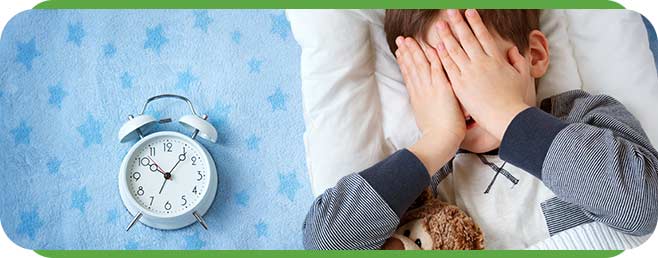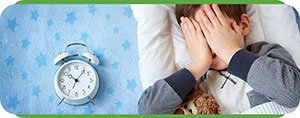Common Pediatric Sleep Problems Q&A
If your child is having sleep problems and you are also affected by this situation, visit us. Call our team of professionals today at Koala Center For Sleep & TMJ Disorders or visit us online to book an appointment. We have convenient locations across the U.S. in Bloomington IL, Peoria/Dunlap IL, El Paso TX and Wausau WI.


Table of Content:
What are three common sleep problems in early childhood?
How are sleep disorders diagnosed in children?
How is a pediatric sleep disorder treated?
How can I get my child to sleep better?
Sleep is as vital to our health as the air we breathe, the food we eat, and the water we drink. When we do not get enough sleep, our bodies and minds pay a heavy price. Sleep is the time when our bodies and minds repair and rejuvenate; when we do not get enough sleep, we feel tired, stressed, and irritable. Pediatric sleep problems are among the most common concerns parents face and affect every child at some point. Fortunately, these sleeping problems are often short-lived and go away on their own, but they can also persist and put a strain on the entire household. The most common pediatric sleep problems are sleeplessness, difficulty falling asleep, and difficulty staying asleep. Sleep difficulties can have a significant impact on the health and well-being of the whole family.
Sleep problems come in many different forms, some of which occur more prevalently in early childhood, including:
– Problems Getting to Sleep — Getting a child to settle down at bedtime can seem like an insurmountable task. Choosing the right bedtime (typically around 7 or 8 in the evening) and developing a relaxing bedtime routine (such as a bath, bedtime story, or lullabies) can be enough to overcome this common problem. However, sometimes problems falling asleep may be linked to anxiety; some children can get to sleep fine with one of their parents in the room, but cannot if they are not present.
– Not Being Able to Get Back to Sleep — It is not uncommon for people to wake up a few times throughout the night; in most cases, we fall back to sleep without issue. This is not always as easy for young children to do, so they might lie awake, get up too early, or start crying.
– Nightmares — Children have very active imaginations, and sometimes this translates to their nocturnal experience as nightmares. Bad or scary dreams can happen at any age, and while older kids and adults can usually shake them off upon waking, it can be terrifying for a child to wake up from a bad dream, especially because their understanding of reality is not yet solidified.
Sleep disorders can be difficult to diagnose, especially in cases where the patient cannot fully elucidate their symptoms and experiences, such as with children. Sleep specialists use a variety of tools to make an accurate diagnosis of a child’s sleep problems, beginning with a complete medical history that includes information about home life, school life, activities, and medications that may be affecting sleep. Some tools that a Doctor may use to diagnose sleep disorders in children include:
– Sleep Diary
– Sleepiness Scale
– Sleep Study
– Multiple Sleep Latency Test
– Blood Test
The treatment for a pediatric sleep disorder largely depends on the type of sleep problem the child is experiencing and is also dependent on several other factors, such as lifestyle, activity level, diet, and mental health. Common treatments for pediatric sleep disorders include:
– Behavioral Modifications — Behavioral modifications are often implemented when children have difficulty maintaining regular sleep patterns, such as with circadian rhythm disorder.
– Natural Remedies — Many parents do not want to give their children psychoactive substances, which are present in most medications. Sometimes medicine is the best treatment for certain sleep disorders characterized by excessive daytime sleepiness, like narcolepsy; while medications are available, natural supplements may be used as a substitute.
– Weight Loss — There is a strong link between excess body weight and obstructive sleep apnea; losing weight can help to minimize symptoms. For sleep apnea, changing sleep positions may also be recommended, as well as nasal sprays or continuous positive airway pressure (CPAP) machines.
– Household Safety Measures — In cases of parasomnias, such as somnambulism (sleepwalking), parents can make their house safer and less prone to accidental injury by moving furniture and blocking staircases.
There are many things parents can do to help their child get a better night’s rest, such as creating a sleeping environment and bedtime routine that will encourage restful sleep:
– Bedrooms should be dark, quiet, and cool
– Beds should be comfortable and cozy
– Quiet time with no screens
– Eating a small snack before bed
– Using the washroom before bed
– Following the same routine at bedtime
If your child is exhibiting symptoms of a sleep disorder, come to Koala® Center For Sleep & TMJ Disorders and speak with our sleep team. We serve patients from all across the United States.

Additional Services You May Need
▸ KoalaKIDZzz®
▸ Sleep Apnea
▸ Snoring
▸ TMJ Disorder
▸ Fatigue
▸ Sleep Disorders
▸ Weight Loss
▸ CPAP Alternative
▸ Oral Appliances




